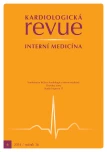-
Medical journals
- Career
Monoclonal PCSK9 antibodies in the treatment of dyslipidemias
Authors: M. Vráblík
Authors‘ workplace: Centrum preventivní kardiologie, 3. interní klinika 1. LF UK a VFN v Praze
Published in: Kardiol Rev Int Med 2014, 16(6): 485-488
Category: Cardiology Review
Overview
The use of targeted therapy with monoclonal antibodies is not yet the standard care in cardiology. However, this approach seems feasible for a number of reasons (e. g. high therapeutic efficacy, lower potential for drug‑drug interactions, the possibility of alternate dosing). The identification of a novel protein (proprotein convertase subtilisin/ kexin 9 – PCSK9) grossly impacting on serum LDL‑cholesterol levels led to the preparation of specific monoclonal antibodies blocking its function. This interaction results in a dramatic decrease of LDL‑cholesterol (and other atherogenic lipoproteins) in the serum by 50 – 70% above the level achievable by currently available therapies. The safety and efficacy of PCSK9 inhibitors is being tested in a large research program of several manufacturers. This new therapeutic option may offer hope for difficult ‑ to ‑ treat patients with familial hypercholesterolemia or statin intolerance, and, in the future, possibly also for patients at high cardiovascular risk not achieving LDL‑cholesterol targets with currently available therapies.
Keywords:
cardiovascular risk – LDL‑cholesterol – lipid lowering drugs – PCSK9 – monoclonal antibodies
Sources
1. Vrablík M, Češka R. Novinky v oblasti hypolipidemické léčby. Vnitř Lék 2014; 60 : 924 – 932.
2. Cuchel M, Bloedon LT, Szapary PO et al. Inhibition of microsomal triglyceride transfer protein in familial hypercholesterolemia. N Engl J Med 2007; 356 : 148 – 156.
3. Kastelein JJ, Wedel MK, Baker BF et al. Potent reduction of apolipoprotein B and low ‑ density lipoprotein cholesterol by short‑term administration of an antisense inhibitor of apolipoprotein B. Circulation 2006; 114 : 1729 – 1735.
4. Sacks FM, Stanesa M, Hegele RA. Severe hypertriglyceridemia with pancreatitis: thirteen years' treatment with lomitapide. JAMA Intern Med 2014; 174 : 443 – 447. doi: 10.1001/ jamainternmed.2013.13309.
5. Seidah NG. PCSK9 as a therapeutic target of dyslipidemia. Expert Opin Ther Targets 2009; 13 : 19 – 28. doi: 10.1517/ 14728220802600715.
6. Catapano AL, Papadopoulos N. The safety of therapeutic monoclonal antibodies: implications for cardiovascular disease and targeting the PCSK9 pathway. Atherosclerosis 2013; 228 : 18 – 28. doi: 10.1016/ j.atherosclerosis.2013.01.044.
7. Abifadel M, Varret M, Rabes JP et al. Mutations in PCSK9 cause autosomal dominant hypercholesterolemia. Nat Genet 2003; 34 : 154 – 156.
8. Zhao Z, Tuakli ‑ Wosornu Y, Lagace TA et al. Molecular characterization of loss ‑ of ‑ function mutations in PCSK9 and identification of a compound heterozygote. Am J Hum Genet 2006; 79 : 514 – 523.
9. Cohen JC, Boerwinkle E, Mosley TH Jr et al. Sequence variations in PCSK9, low LDL, and protection against coronary heart disease. N Engl J Med 2006; 354 : 1264 – 1272.
10. Abifadel M, Elbitar S, El Khoury P et al. Living the PCSK9 adventure: from the identification of a new gene in familial hypercholesterolemia towards a potential new class of anticholesterol drugs. Curr Atherosclerosis Rep 2014; 16 : 439. doi: 10.1007/ s11883 ‑ 014 ‑ 0439 ‑ 8.
11. Hansel TT, Kropshofer H, Singer T et al. The safety and side effects of monoclonal antibodies. Nat Rev Drug Discov 2010; 9 : 325 – 338. doi: 10.1038/ nrd3003.
12. Stein EA, Mellis S, Yancopoulos GD et al. Effect of monoclonal antibody to PCSK9 on plasma LDL cholesterol. N Engl J Med 2012; 366 : 1108 – 1118. doi: 10.1056/ NEJMoa1105803.
13. Stein EA, Wasserman SM, Dias C et al. AMG ‑ 145, Evolocumab. Drugs of the Future 2013, 38 : 451 – 459.
14. Alirocumab Effectively Lowers LDL Cholesterol in Nine Trials: Top ‑ Line Results from ODYSSEY. Medscape 2014; Jul 30. [online] Available from: http:/ / www.medscape.com/ viewarticle/ 829130.
15. Blom D, Hala T, Bolognese M et al. A 52‑week placebo ‑ controlled trial of evolocumab in hyperlipidemia. N Engl J Med 2014; 370 : 1809 – 1819. doi: 10.1056/ NEJMoa1316222.
Labels
Paediatric cardiology Internal medicine Cardiac surgery Cardiology
Article was published inCardiology Review

2014 Issue 6-
All articles in this issue
- Combinations in the treatment of hypertension, including fixed combinations
- Triple-combination in the treatment of hypertension
- Oral antidiabetic drugs – fixed combination therapy
- Combination hypolipidemic therapy
- Combination of anticoagulant and antiaggregant treatment in patients after myocardial infarction with an indication for anticoagulant treatment – so‑ called triple therapy
- Combination immunosuppressant therapy
- Series of complications after heart transplantation – a case report
- When to recommend a combination of ACE-inhibitors and angiotensin receptor blockers
- Monoclonal PCSK9 antibodies in the treatment of dyslipidemias
- Improve IT will change guidelines
- Aortic diseases – diagnosis, classification and management principles
- Genotype‑ phenotype correlation and risk stratification for sudden cardiac death in familial hypertrophic cardiomyopathy – a case study
- Cardiovascular rehabilitation in patients after acute coronary syndrome
- Penetrating cardiac injury – review
- Cardiology Review
- Journal archive
- Current issue
- Online only
- About the journal
Most read in this issue- Aortic diseases – diagnosis, classification and management principles
- Combination of anticoagulant and antiaggregant treatment in patients after myocardial infarction with an indication for anticoagulant treatment – so‑ called triple therapy
- Triple-combination in the treatment of hypertension
- When to recommend a combination of ACE-inhibitors and angiotensin receptor blockers
Login#ADS_BOTTOM_SCRIPTS#Forgotten passwordEnter the email address that you registered with. We will send you instructions on how to set a new password.
- Career

